
‘Muniya’s Quest’ book cover
Credit: By Special Arrangement
Present times
Clothes — check.
Toiletry — check.
Spare sanitizer — check.
Money — check.
Notebook — check.
Pink hospital bracelet.
The bracelet was old and quite fragile. The details had faded. Yet, the name and logo of the hospital remained stubbornly etched, the number on it just about legible. I had to be very careful with it. I took a plastic pouch and slid the weathered bracelet inside it and put the pouch inside the front zip of my black bag.
Pink hospital bracelet — check.
Letter for Abbu.
This was the hardest. I could feel a lump rise in my throat as I tore the page out of my notebook and read what I had written on it one last time. I took my pen, and right at the bottom scrawled: ‘I will be back within a couple of days. But I have to do this. Please take your medicines on time and take it easy.’
I put the letter on the kitchen table and checked, once again, that his medicines were all there and the essentials properly stored for at least a week.
I looked at the clock. 4 p.m. I would reach Vishnupur before sundown if I started now. A lone twelve-year-old travelling after dark is certain to raise eyebrows. I checked the front pocket of my plaid shirt.
Ticket — check.
Pocket sanitizer — check.
I was all set.
Or was I?
I checked one last time for all the items in the bag as I clung to Maau, my black cat. The blue button eyes were no longer hanging out thanks to Abbu’s skills with the needle. I put her into my backpack, right on top where I could feel her paws whenever I reached in. I filled up my water bottle, wore my walking shoes and started towards the door.
Was everything in order? Had I taken everything? I opened the notebook and checked once again.
Water — check.
Ticket — check.
Pocket sanitizer and paper napkins — check.
Below the list, in large letters, I had written, ‘Be strong. Don’t look back.’
The small mirror near the door reflected a tall, gawky and scared girl. I ran my hand through my short curly hair and repeated — a tad loudly this time: ‘Be strong. Don’t look back.’
The resolve seemed to reflect a little in my face.
I closed the door and took a deep breath.
It shouldn’t be difficult. Just one step at a time. One foot forward, and then the next. I could feel my heart pound and the sweat build up under my armpits. I tried to force the second foot, but it wouldn’t move. I just stood there, frozen. I felt the walls starting to move and close in towards me as my knees started to give way.
I can’t do it.
I sat down on the floor, my breath uneven and fast.
I opened my bag’s front zip to take out the house keys, when my hands touched the small plastic pouch — the one with my hospital bracelet. Abbu had saved it through all these years, perhaps hopeful that it would lead me to my parents one day. And even if it was not easy, I had managed to find the first clue. It took countless hours poring over multiple pages of search results on the computer in the school library. And finally, my efforts had yielded results.
The questions flashed, once again, inside me.
Who am I? Where am I from? Why did my parents abandon me? Was Abbu right — were they searching for me too? He said he had gone to Durgapur station every day, for one whole year, with me in tow. Why did they not come for me?
I mustn’t be sad. After all, Abbu loved me and cared for me. But what about all these questions to which I did not have an answer? I had to find out.
This time, I didn’t look back.
I ran out of the house, waving goodbye to all the familiar faces from my neighbourhood, just like I did every day. They would assume I was off to the nearby posher neighbourhood for the Maths classes I gave to my classmate — the same classes that had sponsored this trip for me.
I said a silent prayer for Abbu’s well-being and set off towards the railway station.
I will be back. Very soon.
Extracted from ‘Muniya’s Quest’ by Mandira Shah. Published by Talking Cub (the children’s imprint of Speaking Tiger).
Priced at Rs 299; available online.
Author Q&A with Mandira Shah
What inspired ‘Muniya’s Quest’?
‘Muniya’s Quest’ was inspired by a personal experience. My then 9-year-old observed her classmates checking each other’s diaries to see the caste information entered. This sparked a conversation and a reflection on
the significance of birth identity and its impact on individuals’ lives. The book explores what might happen if a girl were stripped of her birth
identity and sent on an adventure to discover who she truly is and who her parents are.
What can readers expect from it?
I would say a fun adventure story filled with humour and heartwarming moments. The story borrows heavily from people I have met, their quirks
reflected as if seen through funny mirrors.
What are your top three book recommendations for young readers?
1. ‘The Line Tender’ by Kate Allen
2. ‘The Body in the Swimming Pool’ by Shabnam Minwalla
3. ‘Dear Mrs Naidu’ by Mathangi Subramanian